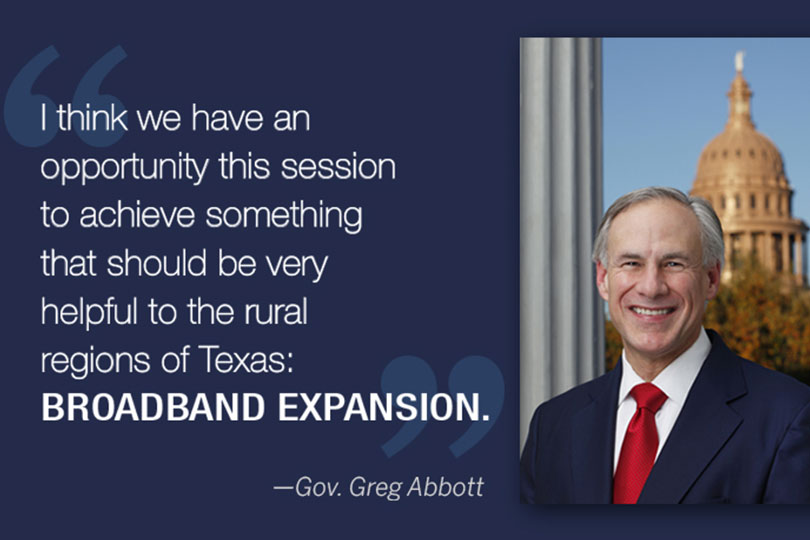By Jennifer Dorsett
Field Editor
The ongoing COVID-19 pandemic’s effect on Texas and the impacts on agriculture were addressed by Gov. Greg Abbott during the Texas Farm Bureau 87th Annual Meeting virtual opening session.
At the beginning of the pandemic, Abbott declared agriculture and agriculture-related businesses as essential services, ensuring those businesses were never shut down.
“We made sure that the agricultural system remained fully engaged,” he said. “We worked with businesses that operate in conjunction with ag-based businesses to ensure they were never shut down or they were able to at least operate with a high level of functionality.”
There were challenges to meat packing facilities in the state, but Abbott said COVID-19 outbreaks were quickly dealt with to keep the food supply chain functioning.
Although agriculture faced unprecedented impacts on supply and demand from shelter-in-place orders and social distancing protocols, there is hope on the horizon.
“We’ve been through this enormous challenge with COVID dating back to March and dealing with wave after wave of people getting COVID with really no capability of responding to it. COVID is a virus, just like the flu is a virus. The reason why flu doesn’t cause us to lead to business lockdowns and things like that is because we have medicines with which we’re able to treat flu,” Abbott said. “Now, we do have the medicines available to us that allow us to treat COVID the same way that we treat other viruses. And as we continue to get increased volumes of these medicines, it will allow us to begin that process of containing COVID.”
Although legislative operations at the Texas Capitol during the upcoming 87th Texas Legislature remain uncertain for now, Abbott remained optimistic about the process and achieving some of TFB’s legislative priorities during this session.
“I will strongly support the Farm Bureau’s initiatives and your policies, and me, personally, but also my staff will work with you all to make sure we are in alignment about what you want to achieve in the session,” Abbott said. “I think we have an opportunity this session to achieve something that should be very helpful to the rural regions of Texas, broadband expansion. There’s high demand for it, whether it be because of education purposes, because of work purposes or whatever the reason, but it’s something that will assist every region of the state. And we want to make sure that the smallest little town or outpost in rural Texas is going to have the same broadband capabilities of Dallas or Houston, so let’s work together on trying to achieve that.”
He noted he feels the state is entering the new budgetary planning cycle on better footing than was initially predicted in June.
“In June, it was in the early aftermath of the initial jarring stages of the response to COVID. We saw a downturn in state revenue, but it did begin to get better in July and August. Things still got better in September and October, but there’s going to be some ups and downs,” Abbott said. “But I think, when all is said and done, the budget shortfall will not be that much, and it will easily be met by one or several different strategies.”
The state’s economic stabilization fund, commonly called the “rainy day fund,” has a large surplus which could be used, if necessary, to meet any budgetary shortfalls. Abbott said the CARES Act or additional funding Congress may pass might also be a source for funds.
More information on those funding sources will be available later in December after Congress reconvenes.
Farmers and ranchers also faced several weather-related challenges in addition to COVID-19.
“Unrelated to COVID, we had to deal with some typical issues over the course of the year. We dealt with wildfires that affected some ag operations,” Abbott said. “We dealt with hurricanes—especially Hurricane Hannah—that hit the ag-based sector in South Texas and worked to assist the ag industry deal with those types of challenges also.”
But the state of Texas is strong, and the Texas economy outlook remains positive, Abbott said.
“People are out shopping. People are out doing things, so Texas is getting going. And I know a lot about what 2021 looks like. 2021 is going to be a very robust year for us economically,” Abbott said. “I feel very confident with these new medicines and with the vaccines that are coming available that we will be able to have an extremely strong economic recovery in 2021. I know that also because I know the number of businesses that are looking to come to Texas and relocate here, and I think that 2021 may actually be our best economic year ever in the history of the state of Texas.”

